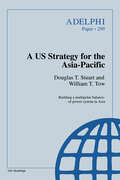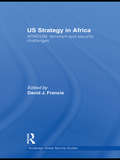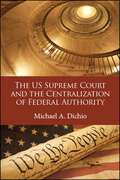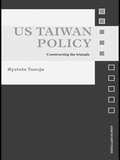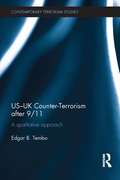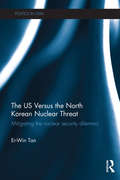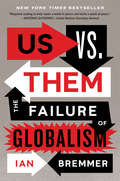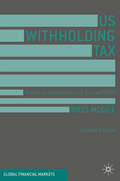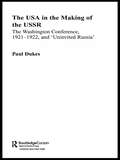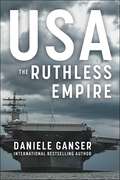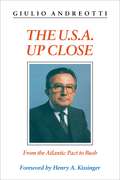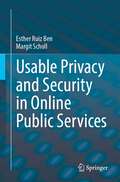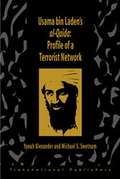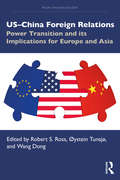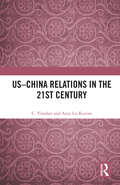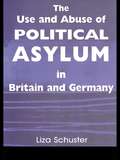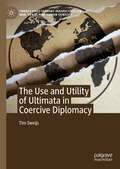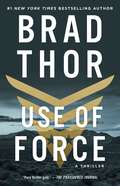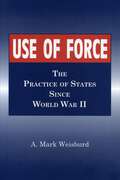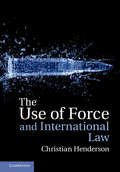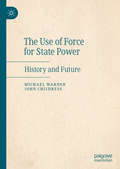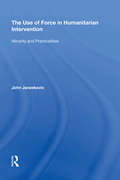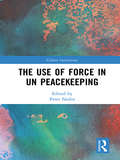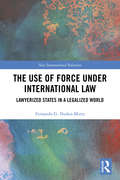- Table View
- List View
A US Strategy for the Asia-Pacific (Adelphi series)
by Douglas T. Stuart William T. TowFirst Published in 2005. This is Adelphi Paper 299 and discusses a strategy for the Unites States of America for the continued stability of the Asia-Pacific region. Looking at ways in which the US-dominated system of Asia-Pacific security that evolved during the Cold War must be fundamentally transformed to determine its security in the future.
US Strategy in Africa: AFRICOM, Terrorism and Security Challenges (Routledge Global Security Studies)
by David J. FrancisThis book outlines the construction, interpretations and understanding of US strategy towards Africa in the early twenty-first century. No single issue or event in the recent decades in Africa has provoked so much controversy and unified hostility and opposition as the announcement by former President George W. Bush of the establishment of the United Stated Africa Command – AFRICOM. The intensity and sheer scale of the unprecedented unity of opposition to AFRICOM across Africa surprised many experts and lead them to ask why such a hostile reaction occurred. This book explores the conception of AFRICOM and the subsequent reaction in two ways. Firstly, the contributors critically engage with the creation and global imperatives for the establishment of AFRICOM and present an analytical outline of African security in relation to and within the context of the history of US foreign and security policy approaches to Africa. Secondly, the book has original chapter contributions by some of the key actors involved in the development and implementation of the AFRICOM project including Theresa Whelan, the former US Deputy Assistant Secretary for African Affairs. This is not only an attempt to contribute to the academic and policy-relevant debates based on the views of those who are intimately involved in the design and implementation of the AFRICOM project but also to show, in their own words, that ‘America has no clandestine agenda for Africa’. This book will be of interest to students of US foreign policy/national security, strategic studies, international security and African politics. David J. Francis is Chair of African Peace & Conflict Studies in the Department of Peace Studies at the University of Bradford.
The US Supreme Court and the Centralization of Federal Authority (SUNY series in American Constitutionalism)
by Michael A. DichioThis book explores the US Supreme Court's impact on the constitutional development of the federal government from the founding era forward. The author's research is based on an original database of several hundred landmark decisions compiled from constitutional law casebooks and treatises published between 1822 and 2010. By rigorously and systematically interpreting these decisions, he determines the extent to which the court advanced and consolidated national governing authority. The result is a portrait of how the high court, regardless of constitutional issue and ideology, persistently expanded the reach and scope of the federal government.
US Taiwan Policy: Constructing the Triangle
by Øystein TunsjøThe relationship between the United States and China is one of the most important issues in the twenty-first century, and is, ultimately, hostage to conditions across the Taiwan Strait. This book is the first to attempt to trace the historical origin of what is known as theTaiwan issue in US-China relations from a constructivist perspective.
Us, Them, and Others
by Elke WinterHow do countries come to view themselves as being 'multicultural'? Us, Them, and Others presents a dynamic new model for understanding pluralism based on the triangular relationship between three groups -- the national majority, historically recognized minorities, and diverse immigrant bodies. Elke Winter's research illustrates how compromise between unequal groups is rendered meaningful through confrontation with real or imagined outsiders.Us, Them, and Others sheds new light on the astonishing resilience of Canadian multiculturalism in the late 1990s, when multicultural policies in other countries had already come under heavy attack. Winter draws on analyses of English-language newspaper discourses and a sociological framework to connect discourses of pan-Canadian multicultural identity to representations of Quebecois nationalism, immigrant groups, First Nations, and the United States. Taking inspiration from the Canadian experience, Us, Them, and Others is an enticing examination of national identity and pluralist group formation in diverse societies.
US-UK Counter-Terrorism after 9/11: A qualitative approach (Contemporary Terrorism Studies)
by Edgar TemboThis book provides a qualitative analysis of post-9/11 counter-terrorism strategy undertaken by the United Kingdom and United States of America. Since 9/11, both the UK and the U.S have significantly revamped their counter-terrorism approaches. The approaches apply, to varying degrees, three key policy instruments – intelligence, law enforcement and military force. However, the success or failure of these counter-terrorism strategies has never been satisfactorily validated. Analysts and policymakers alike have assumed success due to the inability of terrorists to conduct 7/7 and 9/11, respectively, scale attacks upon each state. This assumption has existed despite the fact that it fundamentally underestimates the impact of transnational terrorism. This volume provides an in-depth qualitative assessment of the three primary policy instruments implemented to counter the transnational threat of terrorism during the period 2001-2011; an approach somewhat neglected by the current body of literature which focuses on a purely quantitative methodology. Drawing upon previously unpublished data collected from interviews with policymakers, specialists and academics, the book fills this lacuna by ascertaining and analysing both the UK’s and USA’s counter-terrorism strategies and developing a holistic approach to understanding these strategies. This book will be of interest to students of terrorism and counter-terrorism studies, security studies and IR in general.
The US Versus the North Korean Nuclear Threat: Mitigating the Nuclear Security Dilemma (Politics in Asia)
by Er-Win TanAlthough the current world order is still dominated by the US, there is increasing international concern over the possibility of regional security dilemmas arising from smaller powers’ attempts to develop Weapons of Mass Destruction. A study of US-North Korean interaction using the security dilemma as a conceptual frame of analysis is thus not only hugely topical, but also particularly relevant for the 21st century on theoretical as well as empirical grounds. Is there the prospect of a security dilemma contagion if North Korea acquire nuclear weapons capability leading to an Asia Pacific wide nuclear arms race? This book examines this contentious issue in-depth and explores the difficult choices policymakers face as a result of the uncertainty in international politics.
Us vs. Them: The Failure of Globalism
by Ian Bremmer"A cogent analysis of the concurrent Trump/Brexit phenomena and a dire warning about what lies ahead...a lucid, provocative book." --Kirkus Reviews Those who championed globalization once promised a world of winners, one in which free trade would lift all the world's boats, and extremes of left and right would give way to universally embraced liberal values. The past few years have shattered this fantasy, as those who've paid the price for globalism's gains have turned to populist and nationalist politicians to express fury at the political, media, and corporate elites they blame for their losses. The United States elected an anti-immigration, protectionist president who promised to "put America first" and turned a cold eye on alliances and treaties. Across Europe, anti-establishment political parties made gains not seen in decades. The United Kingdom voted to leave the European Union.And as Ian Bremmer shows in this eye-opening book, populism is still spreading. Globalism creates plenty of both winners and losers, and those who've missed out want to set things right. They've seen their futures made obsolete. They hear new voices and see new faces all about them. They feel their cultures shift. They don't trust what they read. They've begun to understand the world as a battle for the future that pits "us" vs. "them." Bremmer points to the next wave of global populism, one that hits emerging nations before they have fully emerged. As in Europe and America, citizens want security and prosperity, and they're becoming increasingly frustrated with governments that aren't capable of providing them. To protect themselves, many government will build walls, both digital and physical. For instance... * In Brazil and other fast-developing countries, civilians riot when higher expectations for better government aren't being met--the downside of their own success in lifting millions from poverty. * In Mexico, South Africa, Turkey, Indonesia, Egypt and other emerging states, frustration with government is on the rise and political battle lines are being drawn. * In China, where awareness of inequality is on the rise, the state is building a system to use the data that citizens generate to contain future demand for change * In India, the tools now used to provide essential services for people who've never had them can one day be used to tighten the ruling party's grip on power. When human beings feel threatened, we identify the danger and look for allies. We use the enemy, real or imagined, to rally friends to our side. This book is about the ways in which people will define these threats as fights for survival. It's about the walls governments will build to protect insiders from outsiders and the state from its people.And it's about what we can do about it.
US Withholding Tax: Practical Implications of QI and FATCA (Global Financial Markets)
by Ross McGillThe US QI and FATCA regulations came into being in 2001 and 2010 respectively. They remain today the most challenging cross border tax regulations for financial institutions to comply with and operationalise. There is an increasing trend for financial institutions to become QIs while at the same time, the rules of the QI program become more complex and onerous. Equally, most NQIs have little idea that they are subject to these extra-territorial regulations. The US FATCA anti-tax evasion framework has also evolved through the development of intergovernmental agreements. These are complex and bilaterally jurisdiction specific as well as of multiple types. Most firms are struggling to understand the concepts and how FATCA rules overlap and are affected by QI rules. The original book on this subject by the author continues to be the only book able to explain these regulations in ways that allow financial institutions to understand their compliance obligations and take practical steps to meet them, by hearing about best practice. This second edition builds on the basic framework of the QI and FATCA frameworks by updating the text to encompass the changes that have occurred since the book’s original publication. This edition will also delete material that has become obsolete or was proposed by the IRS originally but never implemented.
The USA in the Making of the USSR: The Washington Conference 1921-22 and 'Uninvited Russia' (Routledge Studies in the History of Russia and Eastern Europe)
by Paul DukesThe USA's contribution to the making of the USSR was accidental. In the belief that the Russian Socialist Federative Soviet Republic could not survive, American statesmen strove to keep the former Tsarist empire intact for a non-communist successor regime in the face of attempts by other powers to carve out spheres of influence in both European and Asiatic Russia. In this manner, they unwittingly facilitated the formation of the Union of Soviet Socialist Republics.This book shows the importance of the 'Russian question' at the Washington Conference and throws light on the emergence of the 'Versailles-Washington' system of international relations.
USA: The Ruthless Empire
by Daniele GanserEmpires rise and fall; they do not last. In the eyes of many, the US exerts the strongest destabilizing influence on world events, and thus presents the greatest threat to world peace. World power #1 hasn&’t acquired this top position by chance. Since 1945, no other nation has bombed as many other countries or toppled as many governments as the US. It maintains the most military bases, exports the most weapons, and has the highest defense budget in the world. USA: The Ruthless Empire explains the background factors, motives, and resources of this world power.
The USA Up Close: From the Atlantic Pact to Bush
by Giulio Andreotti"Seeing ourselves through others' eyes is often instructive...[Prime Minister Giulio] Andreotti, a fixture of postwar Italian government, brings [to this examination of U.S. politics] a keen mind and the perspective of a political system in which charisma is suspect..."-Foreign Affairs "Rich, not only in the usual anecdotes of the author's encounters with famous Americans, but also in reflections on the moments that molded the extraordinary relationship between Italy and the U.S... [Andreotti] will be judged by historians to be, warts and all, one of Italy's, and Europe's, truly remarkable statesmen."-Choice
Usable Privacy and Security in Online Public Services
by Esther Ruiz Ben Margit SchollThis practice-oriented book is a unique guide to the implementation of usable, privacy-compliant and secure online services in the area of e-government. Beginning with a clarification of basic concepts of usability, data privacy, and cybersecurity, the book provides lucid explanations of different methods (quantitative, qualitative, and mixed methods) that can be applied in the practice of designing, developing, and evaluating online public services in light of both usability criteria and data privacy and IT security compliance. A number of examples and exercises are included as well as awareness-raising measures that can serve as orientation both for practitioners and for teaching purposes. There is also a concise glossary of terms along with recommendations for further reading.This book provides comprehensive coverage of usability, data privacy and information security topics. At the time of going to press, it is also up to date with respect to the implementation of the EU Single Digital Gateway regulation. It is therefore aimed at anyone interested in understanding the principles of usable privacy and information security and in ways of contributing to the design, development, and evaluation of online public services that satisfy the needs of the public. The book’s audience thus includes not only students in the areas of e-government or public administration but also professionals developing online services or e-government applications.
Usama bin Laden's al-Qaida: Profile of a Terrorist Network
by Yonah Alexander Michael S. SwetnamThe history, ideology, objectives, structure, financial supporters, groups, areas of operation, headquarters, tactics and capabilities, targets and attacks of the al-Qaida.
US–China Foreign Relations: Power Transition and its Implications for Europe and Asia (Asian Security Studies)
by Robert S. Ross, Øystein Tunsjø, and Wang DongThis book examines the power transition between the US and China, and the implications for Europe and Asia in a new era of uncertainty. The volume addresses the impact that the rise of China has on the United States, Europe, transatlantic relations, and East Asia. China is seeking to use its enhanced power position to promote new ambitions; the United States is adjusting to a new superpower rivalry; and the power shift from the West to the East is resulting in a more peripheral role for Europe in world affairs. Featuring essays by prominent Chinese and international experts, the book examines the US–China rivalry, the changing international system, grand strategies and geopolitics, foreign policy, geo-economics and institutions, and military and technological developments. The chapters examine how strategic, security, and military considerations in this triangular relationship are gradually undermining trade and economics, reversing the era of globalization, and contributing to the breakdown of the US-led liberal order and institutions that will be difficult to rebuild. The volume also examines whether the adversarial antagonism in US–China relations, the tension in transatlantic ties, and the increasing rivalry in Europe–China relations are primarily resulting from leaders’ ambitions or structural power shifts. This book will be of much interest to students of Asian security, US foreign policy, European politics, and International Relations in general.
US–China Relations in the 21st Century
by C. Vinodan Anju Lis KurianThe beginning of the new millennium marked the meteoric rise of China in a decades-old world order dominated by the United States of America. This book explores the intricacies of China’s political, economic and diplomatic relationship with the US and its consequences on international politics. It looks at the historical evolution of the US–China relationship, their struggle for strategic power in various regions of the world, as well as their bilateral involvement. The volume focuses on the need for greater Sino-American political and strategic partnerships in order to address global concerns such as non-proliferation of arms and nuclear weapons, climate change, energy security and international terrorism. It also looks at China’s growing influence, the Belt and Road initiative and areas of conflicts and mutual interest. The authors unravel the major conflicts and political developments between the two countries offering a deeper insight into the challenges and strategies for greater co-operation and resolution of differences in the coming decades. This book will be of great interest for researchers and scholars of international relations, China studies, comparative politics, development studies and public policy. It will also be useful for think tanks, policy makers and general readers interested in the USA–China relationship.
The Use and Abuse of Political Asylum in Britain and Germany (British Politics and Society)
by Liza SchusterAll European states have the legal right to grant asylum but only Germany is obliged by law to do so. Liza Schuster contributes to the asylum debate primarily in the area of comparative politics in this study of British and German policies on asylum practice.
The Use and Utility of Ultimata in Coercive Diplomacy (Twenty-first Century Perspectives on War, Peace, and Human Conflict)
by Tim SweijsUniversity of Southern Denmark, Denmark Ultimata feature as a core concept in the coercive diplomacy scholarship. Conventional wisdom holds that pursuing an ultimatum strategy is risky. This book shows that the conventional wisdom is wrong on the basis of a new dataset of 87 ultimata issued from 1920–2020. It provides a historical examination of ultimata in Western strategic, political, and legal thought since antiquity until the present, and offers a four-pronged typology that explains their various purposes and effects: 1) the dictate, 2) the conditional war declaration, 3) the bluff, and 4) the brinkmanship ultimatum. The book yields a better understanding of interstate threat behaviour at a time of surging competition. Background materials can be consulted at www.coercivediplomacy.com.
Use of Force: A Thriller (The Scot Harvath Series #16)
by Brad ThorFrom the #1 New York Times and #1 Wall Street Journal bestselling author Brad Thor comes &“his very best&” (The Washington Times) thriller, following covert operative Scot Harvath as he is called upon to stop an ISIS-led plot to destroy the Vatican.As a storm rages across the Mediterranean Sea, a terrifying distress call is made to the Italian Coast Guard. Days later, a body washes ashore. Identified as a high value but missing terrorism suspect, his name sends panic through the Central Intelligence Agency. Where was he headed? What was he planning? And could he be connected to the &“spectacular attack&” they have been fearing all summer? In a race against time, the CIA taps an unorthodox source to get answers: Navy SEAL turned covert counterterrorism operative, Scot Harvath. Hired on a black contract, Harvath provides the deniability the United States needs, while he breaks every rule along the way. Teeming with fascinating characters and electrifying intrigue, Brad Thor does it again and proves why he is known around-the-world as a master of thrillers.
Use of Force: The Practice of States Since World War II
by Arthur Mark WeisburdThis book is among the few to develop in detail the proposition that international law on the subject of interstate force is better derived from practice than from treaties. Mark Weisburd assembles here a broad body of evidence to support practice-based rules of law on the subject of force. Analyses of a particular use of force by a state against another state generally begin with the language of the Charter of the United Nations. This approach is seriously flawed, argues Weisburd. States do not, in fact, behave as the Charter requires. If the legal rule regulating the use of force is the rule of the Charter, then law is nearly irrelevant to the interstate use of force. However, treaties like the Charter are not the only source of public international law. Customary law, too, is binding on states. If state behavior can be shown to conform generally to what amount to tacit rules on the use of force, and if states generally enforce such rules against other states, then the resulting pattern of practice strongly supports the argument that the use of force is affected by law at a very practical level. This work aims to demonstrate that such patterns exist and to explain their content. Weisburd discusses over one hundred interstate conflicts that took place from 1945 through 1991. He focuses on the behavior of the states using force and on the reaction of third parties to the use of force. He concentrates upon state practice rather than upon treaty law and does not assume a priori that any particular policy goal can be attributed to the international legal system, proceeding instead on the assumption that the system's goals can be determined only by examining the workings of the system.
The Use of Force and International Law: The Impact Of The United States Upon The Jus Ad Bellum In The Post-cold War Era (The\ashgate International Law Ser.)
by Christian HendersonThe Use of Force and International Law offers an authoritative overview of international law governing the resort to force. Looking through the prism of the contemporary challenges that this area of international law faces, including technology, sovereignty, actors, compliance and enforcement, this book addresses key aspects of international law in this area: the general breadth and scope of the prohibition of force, what is meant by 'force', the use of force through the UN and regional organisations, the use of force in peacekeeping operations, the right of self-defence and the customary limitations upon this right, forcible intervention in civil conflicts, the controversial doctrine of humanitarian intervention. <P><P>Suitable for advanced undergraduate and postgraduate students, academics and practitioners, The Use of Force and International Law offers a contemporary, comprehensive and accessible treatment of the subject. Follows a clear and accessible structure to better support lecturers teach their courses and aid student understanding.<P> Clearly lays out the distinction between concepts and terms to enable students to grasp the fundamental distinctions before delving deeper into the subject.<P> Comprehensive references to primary and secondary sources support student understanding of the breadth of legal resources in the field and aid further research.
The Use of Force for State Power: History and Future
by Michael Warner John ChildressThis book studies force, the coercive application of power against resistance, building from Thomas Hobbes’ observation that all self-contained political orders have some ultimate authority that uses force to both dispense justice and to defend the polity against its enemies. This cross-disciplinary analysis finds that rulers concentrate force through cooperation, conveyance, and comprehension, applying common principles across history. Those ways aim to keep foes from concerting their actions, or by eliminating the trust that should bind them. In short, they make enemies afraid to cooperate, and now they are doing so in cyberspace as well.
The Use of Force in Humanitarian Intervention: Morality and Practicalities
by John JanzekovicHumanitarian intervention is a many layered and complex concept. While moral society has an obligation to stop deliberate and persistent serious human rights abuse, the direct use of force remains a contentious option alongside other strategies employed by the international community. This study analyzes the various ethical positions, particularly consequentialism, welfare-utilitarianism and just war theory to unravel this intricate topic. Uniquely, the book goes beyond previous philosophical or ethical treatments of the subject to provide a more rounded and practical reflection on the lessons learned from the revival of humanitarian intervention as a tool of conflict resolution.
The Use of Force in UN Peacekeeping (Global Institutions)
by Peter NadinThis edited volume provides a detailed and nuanced analysis of UN peacekeeping and the use of force, to inform a better understanding of the complex and interconnected issues at stake for the UN community. Peacekeeping is traditionally viewed as a largely passive military activity, governed by the principles of impartiality, consent, and the minimum use of force. Today, most large UN Peacekeeping Operations are only authorized to use force in defence of their mandates and to protect civilians under imminent threat of physical violence. Recently, with the deployment of the Force Intervention Brigade in the DRC, the UN has gone beyond peacekeeping and into the realm of peace-enforcement. These developments have brought to the fore questions regarding the use of force in the context of peacekeeping. The key questions addressed in this book examine not only the utility of force, but also the dilemmas and constraints inherent to the purposive use of force at a strategic, operational and tactical level. Should UN peacekeepers exercise military initiative? Is UN peacekeeping capable of undertaking offensive military operations? If so, then under what circumstances should peacekeepers use force? How should force be wielded? And against whom? With chapters written by experts in the field, this comprehensive volume will be of great use and interest to postgraduate students, academics and experts in international security, the UN, peacekeeping and diplomacy.
The Use of Force under International Law: Lawyerized States in a Legalized World (New International Relations)
by Fernando G. Nuñez-MietzThe international system is becoming increasingly legalized, with legal arguments and legal advisors playing an increasingly important part in the state policymaking process. Presenting a practice-oriented theory of compliance with international law, this book shows how international law affects the behavior of increasingly lawyerized states in an ever more legalized world. By highlighting the legalization of international legitimation and the lawyerization of policymaking as the new engines of compliance, the book’s analytical framework rethinks the relationship between state behavior and international law, and provides an empirical focus on security through the study of NATO’s military intervention in Yugoslavia in 1999 and the changes in the US detention and interrogation programs in the "War on Terror." Relying on primary sources, the author demonstrates the effect of lawyerized decision making on international law compliance, reconstructing the strategies of (de-)legitimation used to show that international law is the hegemonic frame of reference in interstate debates. This book will be of interest to scholars of international relations, government studies, foreign service studies and lawyers employed in government work.
